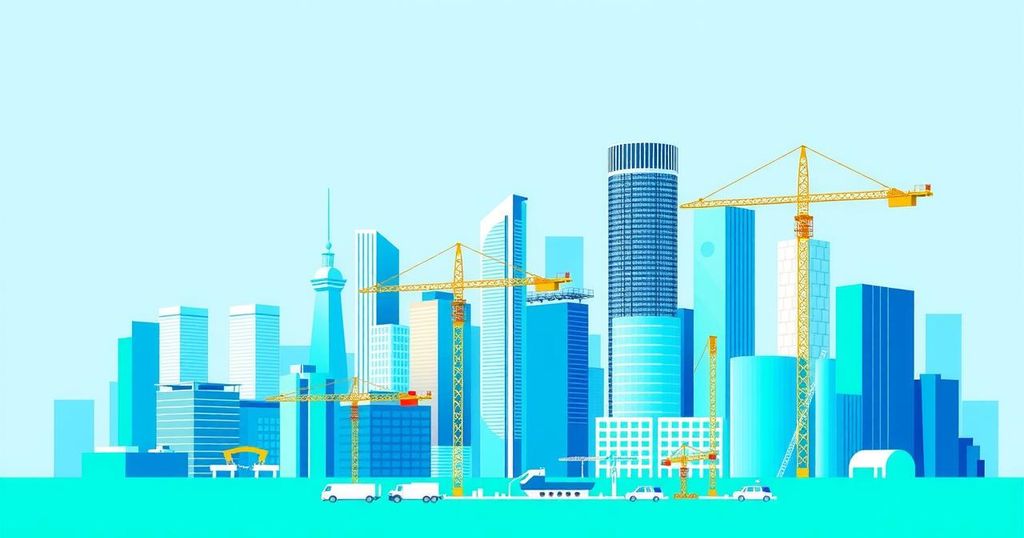Business
economics
AFRICA, ASIA, BUDGET, CAPE TOWN, CHINA, ECONOMIC GROWTH, ECONOMY, ENOCH GODONGWANA, GOD, GODONGWANA, INFRASTRUCTURE, INFRASTRUCTURE DEVELOPMENT, NATIONAL ROADS AGENCY, PASSENGER RAIL AGENCY OF SOUTH AFRICA, SOUTH AFRICA, SOUTH AFRICAN NATIONAL ROADS AGENCY, U. S, XABISO MKHABELA, XINHUA
Jamal Walker
0 Comments
South Africa Commits Over 54 Billion USD to Infrastructure Development
On March 12, 2025, South Africa revealed plans for a 54.5 billion USD investment in public infrastructure over three years to stimulate economic growth, emphasizing transport, energy, and sanitation. Finance Minister Enoch Godongwana announced strategies to address stagnation and proposed a modest VAT increase to generate necessary revenue for crucial services.
On March 12, 2025, South Africa unveiled a comprehensive three-year infrastructure plan amounting to over 1 trillion rand (approximately 54.5 billion U.S. dollars) aimed at bolstering economic growth. This significant announcement was made by Finance Minister Enoch Godongwana during the 2025 budget speech delivered in Cape Town, amid delays caused by internal disagreements regarding a proposed increase in value-added tax (VAT).
In his address, Minister Godongwana emphasized the vital role of infrastructure in the country’s growth strategy, stating, “Infrastructure is a key pillar of our growth strategy. It is the bedrock of economic development, a key source of jobs, and an avenue to scale up service delivery.” He noted that capital payments are projected to be the fastest-growing area of government spending, reinforcing the focus on public infrastructure over the coming years.
The funding allocation for infrastructure will target three principal sectors: 402 billion rand for transport and logistics, 219.2 billion rand for energy infrastructure, and 156.3 billion rand for water and sanitation projects. Specific initiatives include a planned expenditure of 100 billion rand by the South African National Roads Agency to maintain the national road network and a provisional allocation of 19.2 billion rand for essential signaling upgrades by the Passenger Rail Agency of South Africa.
Minister Godongwana also highlighted the stagnation faced by the South African economy over the past decade, with a modest GDP growth rate averaging less than 2 percent. He pointed out that in 2024, growth was a mere 0.6 percent, with projections indicating an average of 1.8 percent for the medium term between 2025 and 2027. Furthermore, consolidated government spending is anticipated to increase significantly from 2.4 trillion rand in the 2024/25 financial year to 2.83 trillion rand by 2027/28.
While a primary budget surplus of 0.5 percent of GDP is expected in 2024/25, increasing to 0.9 percent in 2025/26, the government debt is projected to stabilize at 76.2 percent of GDP during 2025/26, with a reduction of the consolidated budget deficit to 3.5 percent by 2027/28. Additionally, the government has proposed a marginal VAT increase of 0.5 percentage points in 2025/26 and another in the succeeding year, raising the rate to 16 percent by 2026/27.
Godongwana underscored the necessity of the VAT adjustment to address persistent financial pressures within essential sectors such as health and education. This adjustment is expected to generate additional revenue of 28 billion rand in 2025/26 and 14.5 billion rand in 2026/27. He acknowledged the careful consideration of alternative tax increases, emphasizing that the decision to raise VAT was made in light of unmet service delivery needs crucial for development goals. “This decision was not made lightly… However, we have had to balance this knowledge against the very real and pressing service delivery needs that are vital to our developmental goals and cannot be further postponed,” he stated.
South Africa’s announcement of a substantial investment in infrastructure, exceeding 1 trillion rand, aims to stimulate economic growth and address service delivery challenges. The focus on transportation, energy, and water infrastructure highlights the government’s commitment to revitalizing the economy while managing rising budget deficits and government debt effectively. This strategic approach seeks to bolster job creation and improve essential services, balancing the immediate fiscal needs with long-term developmental goals.
Original Source: english.news.cn




Post Comment